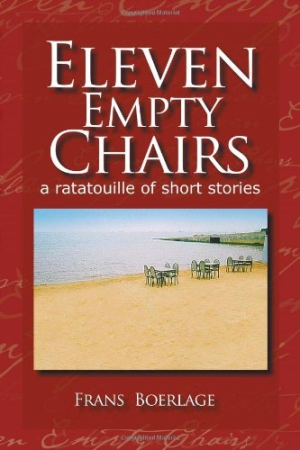Eleven Empty Chairs
A Ratatouille of Short Stories
Books that cannot be classified often fall between marketing cracks, putting them into an esoteric zone where they may find an audience among the literary-minded and artistic achievers. Eleven Empty Chairs: A Ratatouille of Short Stories is one of those titles. An unusual hodgepodge of short stories, vignettes, and poems, with a bit of memoir thrown in alongside illustrations and personal photos, this scrapbook of memories and dreams will appeal to the avid reader of stream-of-consciousness works.
From a conceptual standpoint, Frans Boerlage veers into a screenplay treatment of writing, as though he is laying the blueprint for visual sequences that need development, as opposed to fully conceived literary scenes. In the fifty-five-page “Chronicle of a Hamlet,” the story begins in 1883 and ends in 1961, with straight narrative and no dialogue, other than an occasional snippet interspersed with the text.
“Kessie,” though not as long, has a similar treatment, evident in the rapid progression of events described in the present tense: “A young and enterprising agent takes Keesie on his roster. He sends him to conductors for auditions. He gets involved with an exciting, young maestro, and his path to recording deals and festival extravaganzas becomes certain. But fame does not make him happy, as he feels cheated out of life.”
Other chapters, composed of one- or two-page candid musings, appear to be taken from a personal journal. “My Private Tannhaeuser,” relating the author’s impressions of the opera, could be defined as autobiographical, and “Paul,” a multipart tribute to a friend, resembles a eulogy.
A few of the stories are ingenious, each conveying a potent social statement. In “Bertie’s Treasure,” a homeless man’s dire predicament is contrasted with the lifestyle habits (and trash cans) of the middle class. Powerful and direct, this purposeful tale is an excellent opener for an eclectic arrangement: “The households of medium income generally left much more stuff for him. Clearly, those people had no thought of Goodwill, and threw perfectly usable articles into their bins. People were often careless.”
The book’s packaging is mediocre. Though an acceptable design graces its cover, the back cover blurb is unpolished. The text is in need of a competent editor.
Within this accumulation of short works is a section of enlightening poetry, which seems oddly out of sync in a prose showcase. At the end is a tacked on bonus, consisting of fictionalized accounts from a cruise that never took place, an unnecessary addition.
A native of Holland, Frans Boerlage is an internationally known opera director with fifty years of experience. He has taught and directed at the University of Southern California, Los Angeles.
To imply that Eleven Empty Chairs was not implemented with control would be inaccurate; individual pieces have been written with extreme care. Yet the overall effect is one of allowing a soup to develop slowly from whatever food may be left in the refrigerator. This conglomeration is apparently what the author intends, and for the adventurous soul encountering his collection, that is exactly the point of his creation.
Reviewed by
Julia Ann Charpentier
Disclosure: This article is not an endorsement, but a review. The publisher of this book provided free copies of the book and paid a small fee to have their book reviewed by a professional reviewer. Foreword Reviews and Clarion Reviews make no guarantee that the publisher will receive a positive review. Foreword Magazine, Inc. is disclosing this in accordance with the Federal Trade Commission’s 16 CFR, Part 255.

